- Home
- Sue Grafton
G is for GUMSHOE Page 13
G is for GUMSHOE Read online
Page 13
Dietz looked up. The waiter was approaching, dressed like an usher at a wedding, complete with white gloves.
“Good afternoon. Something to drink before lunch?” The waiter’s manner was circumspect and he avoided making eye contact.
Dietz turned to me. “You want a drink?”
“White wine,” I said.
“Chardonnay, sauvignon blanc?” the waiter asked.
“Chardonnay.”
“And you, sir?”
“I’ll have a beer. What do you have imported?”
“Amstel, Heineken, Beck’s dark, Beck’s light, Dos Equis, Bohemia, Corona…”
“Beck’s light,” Dietz said.
“Are you ready to order?”
“No.”
The waiter stared at Dietz, then nodded and withdrew.
Dietz said, “We probably won’t see him for half an hour, but I hate being bullied into ordering.”
He picked up his story again about Bertie the crow, who liked to take long walks on foot and lived on a diet of M M’s, hardboiled eggs, and dry cat food. While Dietz talked, his gaze shifted restlessly around the room. He seldom looked at faces, always at hands, checking for concealed weapons, sudden movements, signals perhaps. Some underling arrived, bearing our drinks, but the waiter didn’t return. Dietz scanned the dining room, but there was no sign of Mm. Twenty minutes passed. I could see Dietz take note and in a surge of uneasiness, he finally tossed a bill on the table and got up. “Let’s get out of here. I don’t like this.”
“Do you see everything as part of some plot?” I asked, trotting after him.
“That may be all that keeps the two of us alive.” I shrugged to myself and let it go at that. When we reached the front entrance, the Porsche was parked right up against the shrubs. He snagged the keys off the board himself and helped me into the car. He got in on his side and fired up the engine.
We drove home along the beach. I was exhausted and my head was starting to pound. When we got to my apartment, Dietz hauled out his portable alarm system, which he showed me how to arm and disarm. He affixed it to the door.
“I’ll tell Henry to keep an ear turned while I’m out…”
“You’re going off somewhere?” I felt a little bubble of panic arise, testimony to how quickly I’d come to depend on him for my sense of personal safety.
“I want to have another chat with Lieutenant Dolan. He said he’d talk to the Carson City DA and try to get an ID on this guy with the kid. Somebody must have heard of him. Maybe we can pick up a mug shot and at least figure out what he looks like. I’ll be back in half an hour. You’ll be fine here. Get some rest. You look beat.”
He took off while I downed a pain pill and headed up to the loft. I had promised to call Irene and I could feel the tiny voice of my conscience whining deep within. The phone rang just as I was pulling off my shoes. Dietz had told me not to answer it if he wasn’t there, but I couldn’t help myself. I leaned across the bed and picked up the receiver.
It was Irene Gersh. “Oh good, it’s you. I’m calling from the nursing home. I’m so glad you’re there. I was afraid you were still out.”
“We just got in. I was thinking I should call you, but I hadn’t worked up the energy.”
“Is this a bad time?”
“It’s fine. Don’t worry about it. What’s happening?”
“Nothing. That’s the point. I’m sorry to be such a pest, but I’m just beside myself. Mother’s been gone now for eight hours and there’s simply no sign of her. Clyde feels maybe we should get out and check the neighborhood ourselves.”
“Sounds smart,” I said. “You need any help knocking on doors?” In that split second my concern for Agnes’s safety overrode my worries about myself.
“Thank you. We’d appreciate it. The longer Mother’s on the loose, the more frightened I get. Somebody must have seen her.”
“You’d think so,” I said. “When do you need me there?”
“Soon if you could. Clyde called from work and he’s on his way over now. If it’s not too much trouble…” She gave me an address in the eleven hundred block of Concorde.
“I’m on my way,” I said and hung up. I put a quick call through to Lieutenant Dolan’s office and left word for Dietz to meet me at the nursing home, reiterating the address. That done, I picked my way carefully down the stairs. I craved action. My whole body was seizing up in the wake of the accident and my joints felt stiff with rust. Certain postures caused excruciating pains to shoot through my neck, causing me to murmur, “Ow, ow, ow.” I was hoping the painkiller would do its work before long.
I found a jacket and my handbag, checked to make sure my little .32 was accounted for, and headed for the door, searching for my car keys in the outside leather pouch. Where the hell were they? I stopped dead, perplexed, and then it dawned on me. I didn’t have transportation. My VW was still down in Brawley at the auto body shop. Well, hell, I thought.
I turned on my heel, picked up the phone again, and called a cab. By that point, I had already begun to internalize some of Dietz’s precautions. I knew better than to loiter outside on the curb in plain sight. I waited, dutifully standing in the tub in the downstairs bathroom, where I could look out the window until the cab appeared in front. For the second time, I snatched up my jacket and my handbag. When I opened the front door, the alarm system went off, scaring me so badly that I nearly wet my pants.
Henry’s back door banged open and he came running out with a meat cleaver in his hand. All he had on was a pair of turquoise briefs and his face was pale as bread dough. “My God, what happened? Are you all right?”
“Henry, I’m fine. I accidentally set off the alarm.”
“Well, get back inside. You scared the hell out of me. I was about to take a shower when that damn thing went off. Why are you out here? Dietz said you were napping. You look awful. Go to bed.” His panic had rendered him a little cranky, I thought.
“Would you quit worrying? There’s no cause for hysteria. Irene Gersh called me and I’m on my way over to the nursing home to help look for her mom. I’ve got a cab waiting out in front.”
Henry grabbed my jacket. “You’ll do no such thing,” he said snappishly. “You can wait till Dietz gets back and go over there with him.”
I could feel my temper climb in response to his. I grabbed the jacket back, the two of us tugging like kids in a schoolyard. The cleaver he was holding made it treacherous work.
The second time he reached for the jacket, I held it up and away from him. “Henry,” I said warningly. “I’m a free human being. Dietz knows I’m going over there. I called Dolan’s office and talked to him myself. He’s on his way.”
“You did not. I know you. You’re lying through your teeth,” Henry said.
“I did call!”
“But you didn’t talk to him.”
“I left a message. That’s just as good.”
“What if he never gets it?”
“Then you can tell him where I am! I’m going.”
“No, you’re not!”
I had to argue for five minutes before I was allowed to leave the premises. Meanwhile, the cab driver had already tooted twice and he appeared from around the corner looking for his fare. I don’t know what he must have thought when he caught sight of us… me with my battered face, Henry in his Calvin Klein skivvies with a cleaver in his mitt. Fortunately, Henry knew the guy and after earnest reassurances on all sides, he finally consented to my departure. He didn’t like the idea, but there wasn’t much he could do. The cabbie was still shaking his head with mock disgust. “Get some pants on, Pitts. You could get arrested like that.”
By the time I reached the nursing home on the Upper East Side, it was nearly two o’clock. I realized as the cab pulled up that I knew the neighborhood. Rosie and I had combed the entire area, looking for a board-and-care for her sister, Klotilde. The houses, for the most part, were built on a grand scale: rambling interiors with high ceilings, oversize windows, wide porc
hes, surrounded by massive oaks and old, shaggy palms.
In contrast, the nursing home from which Agnes had disappeared was a two-story Victorian structure with a carriage house in the rear. The frame siding was a pale gray, with the trim done in fresh white. The steeply pitched roof was made of slate tiles, overlapping like fish scales. At the second-story level, a raw-looking L of decking and a set of wooden stairs had been added as a fire escape. The house sat on a large corner lot, the property shaded by countless trees, dotted with flower beds, and bordered with shrubs, which were pierced by the protruding upright arrows of an ornamental iron fence. There were several cars visible in the small parking lot in the rear.
Irene had apparently been watching for my arrival. I paid the driver and emerged from the cab in time to see her moving toward me down the front walk, followed by a gentleman I assumed was Clyde Gersh. Again, I was struck by the aura of illness that surrounded her. She was stick-thin and seemed unsteady on her feet. The shirtwaist dress she wore was a jade-green silk that only emphasized the unearthly pallor of her skin. She’d clearly gone to some trouble with her appearance, but the effect was stark. Her foundation makeup was too peachy a shade, and the false lashes made her eyes jump out of her face. A swath of blusher high on each cheek gave her the look of someone in the throes of a fever. “Oh, Kinsey. God bless you.” She reached for me with trembling hands that were cold to the touch.
“How are you, Irene? Is there any sign of her?”
“I’m afraid not. The police have taken the report and they’ve issued on of those… oh, what do you call them…”
Clyde spoke up. “A ‘be on the lookout’ bulletin.”
“Yes, that’s it. Anyway, they’ll have a patrol car cruising the neighborhood. I’m not sure what else they can do for the time being. I’m just sick.”
Clyde spoke up again, extending his hand. “Clyde Gersh.”
Irene seemed flustered. “Oh, I’m sorry. This is Miss Millhone. I don’t know what I was thinking of.”
Clyde Gersh was probably in his late fifties, some ten years older than his wife. He was tall and stooped, wearing an expensive-looking suit that seemed to hang on his frame. He had a thinning head of gray hair, a lined face, his brow knotted with concern. His features had the droopy quality of a man resigned to his fate. His wife’s state of health, whether real or self-induced, must have been a trial to him. He’d adopted an air of weary patience. I realized I had no idea what he did for a living. Something that entailed a flexible schedule and wingtip shoes. A lawyer? Accountant?
The two of us shook hands. He said, “Nice to meet you, Miss Millhone. I’m sorry for the circumstances.”
“Me, too. I prefer ‘Kinsey,’ if you would. What can I do to help?”
He glanced apologetically at his wife. “We were just discussing that. I’m trying to talk Irene into staying here. She can hold down the fort while we get out and bump doors. I told the director of this two-bit establishment he’ll have a lawsuit on his hands if anything’s happened to Agnes…”
Irene shot him a look. “We can talk about this later,” she said to him. And to me, “The nursing home has been wonderful. They feel Mother was probably confused. You know how willful she is, but I’m sure she’s fine…”
“Of course she is,” I said, though I had my doubts.
Clyde’s expression indicated he had about as much faith as I did. “I’m just heading out if you’d care to join me,” he said. “I think we should check the houses along Concorde as far as Molina and then head north.”
Irene spoke up. “I want to come, Clyde. I won’t stay hereby myself.”
An expression of exasperation flickered briefly in his face, but he nodded agreement. Whatever opposition he may have previously voiced, he now set aside, perhaps in deference to me. He reminded me of a parent reluctant to discipline a kid in front of company. The man wanted to look good. I glanced along the street for some sign of Dietz.
Irene caught my hesitation. “Something wrong, dear? You seemed worried.”
“Someone’s meeting me here. I don’t want to take off without leaving word.”
“We can wait if you like.”
Clyde gestured impatiently. “You two do what you want. I’m going on,” he said. “I’ll take this side and you can take that. We’ll meet here in thirty minutes and see how it looks.” He gave Irene’s cheek a perfunctory kiss before he headed off. She stared after him anxiously. I thought she was going to say something, but she let the moment pass.
“Would you like to tell someone at the nursing home where we’ll be?”
“Never mind,” I said. “Dietz will figure it out.”
Chapter 13
*
We started with the house diagonally across from the nursing home. Like many others in the neighborhood, it was substantially constructed, probably built in the early years of the century. The facade was wide, the two-story exterior shingled in cedar tinted with a pale green wash. A prominent gabled porch sat squarely in the center, matching large bay windows reflecting blankly the sprawling branches of an overhanging oak. I thought I saw movement in an upstairs window as we came up the walk. Irene was clinging to my arm for support. Already, I could tell she was going to slow me down, but I didn’t have the heart to mention it. I was hoping her anxiety would ease if she could help in the search.
I pressed the bell, which jangled harshly. Moments later, the front door opened a crack and a face appeared, an older woman. The burglar chain was still judiciously in evidence. Had I been a thug, I could have kicked the door open with a well-placed boot.
“Yes?”
I said, “Sorry to bother you, but we’re talking to everybody in the neighborhood. An elderly woman’s disappeared from the nursing home across the street and we’re wondering if you might have seen her. About seven this morning. We think that’s when she left.”
“I don’t get up until eight o’clock these days. Doctor’s orders. I used to get up at five, but he says that’s ridiculous. I’m seventy-six. He says there’s nothing going on at that hour that I need to know about.”
“What about your neighbors? Have you heard anybody mention…”
She waved an impatient hand, knuckles speckled and thick. “I don’t talk to them. They haven’t cut that hedge in the last fifteen years. I pay the paperboy to come in once a month and trim it up. Otherwise, it’d grow clear up through the telephone wires. They have a dog comes over in my yard, too. Does his business everywhere. I can’t step a foot out without getting dog doodie on my shoe. My husband’s always saying, ‘Pee-you, Ethel. There’s dog doodie on your shoe again.’ “
I took out one of my business cards, jotting the number of the nursing home on the back. “Could I leave you my card? That way if you hear anything, you can give me a call. We’d appreciate your help.”
The woman took it reluctantly. It was clear she didn’t have much interest in geriatric runaways. “What’s this woman’s name?”
“Agnes Grey.”
“What’s she look like? I can’t very well identify someone I’ve never laid eyes on before.”
I described Agnes briefly. With Irene standing there, I couldn’t very well suggest that Agnes looked like an ostrich.
“I’ll keep an eye out,” she said. And then the door closed.
We tried the next house, and the next, with about the same results. By the time we reached the corner, forty-five minutes had gone by. It was slow work and so far, unproductive. No one had seen Agnes. We headed east on Concorde. A UPS truck approached and we waited on the curb until we’d seen it pass. I put a hand under Irene’s arm as we crossed the street, supervising her safety as Dietz supervised mine.
A fine tremor seemed to be vibrating through the dark green silk of her dress. I studied her uneasily. Years of bleaching had left her hair a harsh white-blond, very thin, as if she’d succeeded finally in eliminating any whisper of color from the wispy strands. She had no brows to speak of, just two brown lines she’d pencile
d in by hand, wide arcs like a child might have drawn on a happy face. I could see that she might have been considered a beauty once upon a tune. Her features were fine, the blue eyes unusual in their clarity. One of her false lashes had come loose, sticking out like a tiny feather. Her complexion was too pale to seem healthy, but the texture of her skin was remarkable. She reminded me of an obscure one-role movie actress of the forties – someone you’re surprised to find alive after all these years. She put a trembling hand on mine, her fingers so icy that I drew back in alarm. Her breathing was rapid and shallow.
“Irene, my God. Your hands are like ice. Are you all right?”
“This happens now and then. I’ll be fine in a minute.”
“Let’s find you a place to sit down,” I said. We were approaching a three-story clapboard house, tall and narrow with a porch on three sides. The yard was sunny, with the grass newly mown and not much attention to the flower beds. I knew it was a board-and-care because Rosie and I had been given the address. I’d never actually seen the inside of the house. Once Rosie realized there was no wheelchair access, we had crossed it off our list. I remembered the owner as an energetic fellow in his seventies, pleasant enough, but apparently not equipped to handle anyone who wasn’t ambulatory. I’d already opened the shrieking iron gate and I could see the front curtain move as someone peered out. This seemed to be a neighborhood where people were on the watch. I couldn’t believe Agnes had managed to get even half a block without someone spotting her.
We reached the front porch and Irene sank down on the bottom step. She put her head between her knees. I put a hand on the back of her neck, peering closely at her face. I could hear the wheezing in her throat.
“You want to lie down?”
“No, please. I’ll be fine. It’s my asthma acting up. I don’t want a fuss made. Just let me sit here for a bit.”
“Just slow your breathing down, okay? You’re starting to hyperventilate. I don’t want you passing out.”

 S Is for Silence
S Is for Silence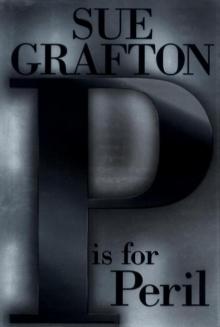 P Is for Peril
P Is for Peril R Is for Ricochet
R Is for Ricochet J Is for Judgment
J Is for Judgment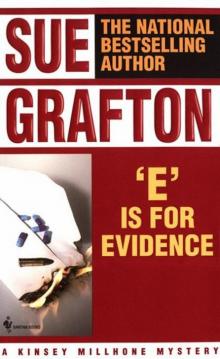 E Is for Evidence
E Is for Evidence T Is for Trespass
T Is for Trespass C Is for Corpse
C Is for Corpse U Is for Undertow
U Is for Undertow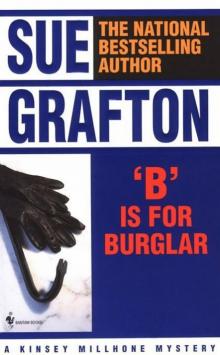 B Is for Burglar
B Is for Burglar Four Sue Grafton Novels
Four Sue Grafton Novels D Is for Deadbeat
D Is for Deadbeat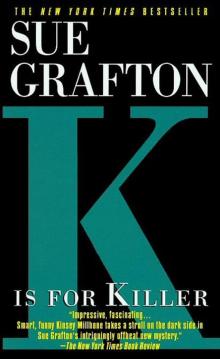 K Is for Killer
K Is for Killer I Is for Innocent
I Is for Innocent A Is for Alibi
A Is for Alibi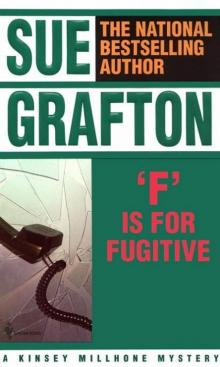 F Is for Fugitive
F Is for Fugitive Q Is for Quarry
Q Is for Quarry W Is for Wasted
W Is for Wasted Kinsey and Me: Stories
Kinsey and Me: Stories L Is for Lawless
L Is for Lawless Y Is for Yesterday
Y Is for Yesterday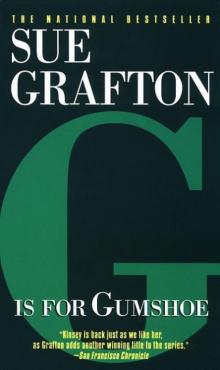 G Is for Gumshoe
G Is for Gumshoe O Is for Outlaw
O Is for Outlaw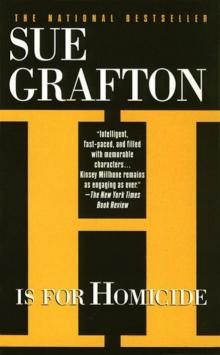 H Is for Homicide
H Is for Homicide X
X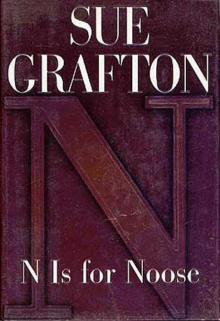 N Is for Noose
N Is for Noose Three Complete Novels: A Is for Alibi / B Is for Burglar / C Is for Corpse
Three Complete Novels: A Is for Alibi / B Is for Burglar / C Is for Corpse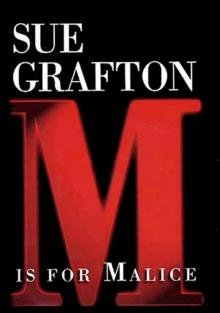 M Is for Malice
M Is for Malice I is for INNOCENT
I is for INNOCENT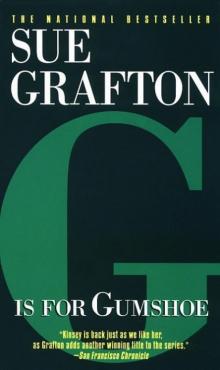 G is for GUMSHOE
G is for GUMSHOE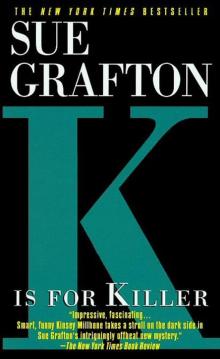 K is for KILLER
K is for KILLER S is for SILENCE
S is for SILENCE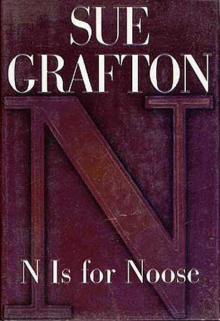 N is for NOOSE
N is for NOOSE D is for DEADBEAT
D is for DEADBEAT V is for Vengeance
V is for Vengeance U is for Undertow
U is for Undertow W Is for Wasted km-23
W Is for Wasted km-23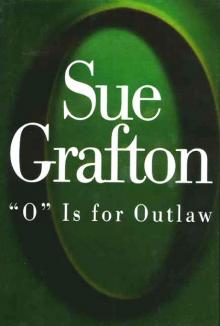 O is for OUTLAW
O is for OUTLAW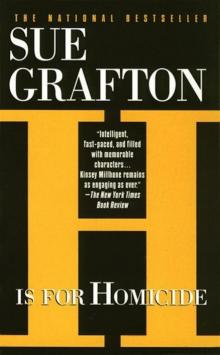 H is for HOMICIDE
H is for HOMICIDE Sue Grafton Novel Collection
Sue Grafton Novel Collection Kinsey and Me
Kinsey and Me C is for CORPSE
C is for CORPSE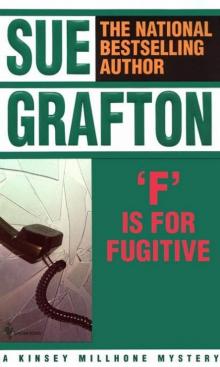 F is for FUGITIVE
F is for FUGITIVE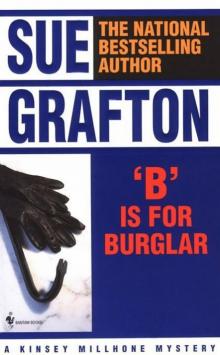 B is for BURGLAR
B is for BURGLAR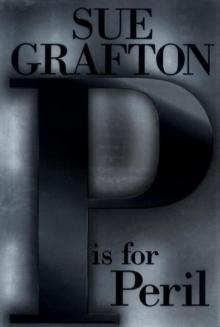 P is for PERIL
P is for PERIL A is for ALIBI
A is for ALIBI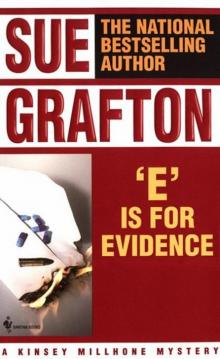 E is for EVIDENCE
E is for EVIDENCE J is for JUDGMENT
J is for JUDGMENT Q is for QUARRY
Q is for QUARRY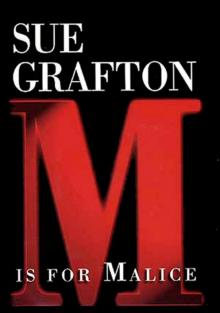 M is for MALICE
M is for MALICE L is for LAWLESS
L is for LAWLESS